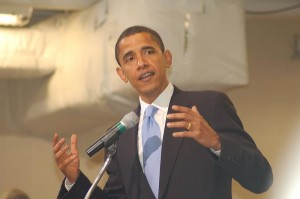 When Barack Obama is not being re-cast as a principled defender of progressive values, his defenders in the press try another sleight-of-hand, defining him as a pragmatist desperately seeking responsible Republicans with whom to cut deals. Enter Paul Krugman’s latest column, “The Gullible Center”,which is a warmed over attack on Paul Ryan’s “extremism” (the ninth from the New York Times editorial pages in seven days, but who’s counting) and a mildly more original jab at moderates who allegedly lavish the undeserved label on seriousness on Ryan’s budget cutting, while missing the genuine article in President Obama.
When Barack Obama is not being re-cast as a principled defender of progressive values, his defenders in the press try another sleight-of-hand, defining him as a pragmatist desperately seeking responsible Republicans with whom to cut deals. Enter Paul Krugman’s latest column, “The Gullible Center”,which is a warmed over attack on Paul Ryan’s “extremism” (the ninth from the New York Times editorial pages in seven days, but who’s counting) and a mildly more original jab at moderates who allegedly lavish the undeserved label on seriousness on Ryan’s budget cutting, while missing the genuine article in President Obama.
A few observations about Krugman’s revisionism. First, I’m not exactly a Ryan devotee for a variety of reasons: marginal tax rate reductions are overstated in Ryan’s model as a tool of economic growth; at the same time, his plan leaves too little room for additional investments in worker retraining, infrastructure, and education (it is particularly worrisome that he would leave Washington with fewer resources to incentivize the wholesale reforms on education that have to be effected at the state level) and it slices out too many elements of the safety net without doing a rigorous accounting of what has and hasn’t worked. Budgeting, Ryan style, is much too vulnerable to the criticism that it is a theory of emasculated government and an ideological tool rather than a blueprint for expanded prosperity.
 But the notion that President Obama is the misunderstood centrist in the budget wars? It’s a fantasy; to paraphrase Krugman’s closing jab at moderates, a naked conceit that has not much substance. Obama’s current budget repeats his minimalist approach to entitlements from last year—a series of mini-measures on cost reduction for Medicare, no rethinking whatsoever of how to restore Social Security to a safety net rather than a substantial net windfall for its beneficiaries. While Ryan has at least traded future structural realignments in Medicare for a safe haven for current beneficiaries, Obama resists countering Ryan, by defending the status quo while outlining an alternative of what a sustainable future looks like. To the contrary, Obama’s budgetary approach to Medicare and for that matter Obamacare mimics conservatives when they load all manner of unrealistic growth assumptions on top of their tax cut proposals: Obama’s version of fanciful thinking is the cost-cutting from comparative efficiency techniques that may or not survive congressional review, and that may or may not be scalable.
But the notion that President Obama is the misunderstood centrist in the budget wars? It’s a fantasy; to paraphrase Krugman’s closing jab at moderates, a naked conceit that has not much substance. Obama’s current budget repeats his minimalist approach to entitlements from last year—a series of mini-measures on cost reduction for Medicare, no rethinking whatsoever of how to restore Social Security to a safety net rather than a substantial net windfall for its beneficiaries. While Ryan has at least traded future structural realignments in Medicare for a safe haven for current beneficiaries, Obama resists countering Ryan, by defending the status quo while outlining an alternative of what a sustainable future looks like. To the contrary, Obama’s budgetary approach to Medicare and for that matter Obamacare mimics conservatives when they load all manner of unrealistic growth assumptions on top of their tax cut proposals: Obama’s version of fanciful thinking is the cost-cutting from comparative efficiency techniques that may or not survive congressional review, and that may or may not be scalable.
The reality is that a presidential candidate who campaigned on incremental regulatory reforms, and who courted Wall Street with a zeal and effectiveness no liberal Democrat has ever mustered, has morphed into a president who believes that the country’s economy is wired in a fundamentally unequal way. The critique is, of course, not entirely out of kilter, and tells its share of truths about the middle class’s struggle to convert work into security. But the critique, in Obama’s hands, is conventionally short-sighted: it focuses on pruning the tax code of marginal rates and upper income shelters that combine to insulate wealth. It is vague and imprecise on the shape of government in an era when entitlement spending is deepening inter-generational inequity and just flat costs too much.
Back to Krugman’s point about centrists. He is right, in fact, more right than he probably means to be, when he diminishes their sway within the Democratic Party. As Krugman allows, centrism of the current Democratic brand more or less coalesces with Obama’s approach: deficit cutting that raises revenue and reins in defense spending without reimagining entitlements; healthcare reform that combines expanded government with “tough love”, but conveniently industry friendly, initiatives like individual mandates. In other words, Krugman’s preferred moderates look a whole lot like liberals who have to count votes, navigate lobbyists, and raise campaign funds.
The old fashioned kind of centrists–the ones who genuinely question whether government is the most efficient deliverer of social goods, the ones who are troubled by the evolution of retirement support programs into retirement dependency programs, the ones who are as skeptical of public sector interests as they are of private sector interests, the ones who prioritize growth over inequality–they’re discredited in the liberal world view that Krugman brilliantly articulates. In fact, not only are they headed toward irrelevance in Democratic circles, if you look closely enough, they are already gone.
(Cross-posted, with permission of the author, from OfficialArturDavis.org)









Leave a Reply